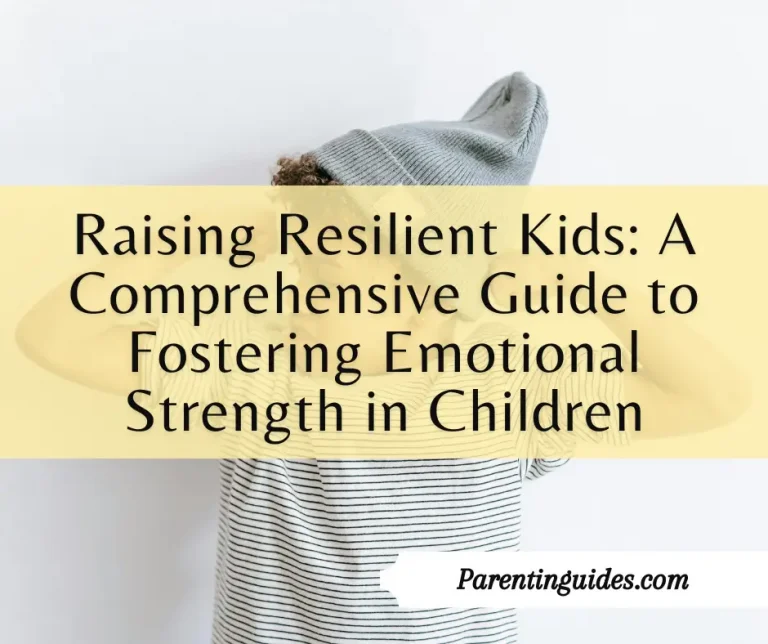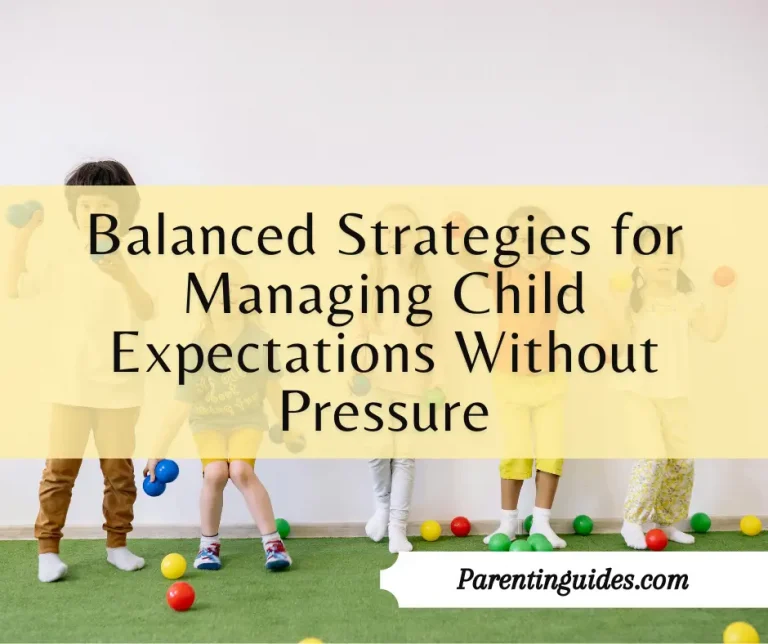Raising children is a journey filled with joy and challenges. As parents, my husband and I have learned that helping children cope with life’s difficulties is essential for their well-being. Resilience, the ability to bounce back from setbacks, is a crucial skill we strive to instill in our children. This article will explore the importance of resilience and provide practical strategies for helping children cope with life’s challenges.
I remember a time when our eldest child faced a tough situation at school. She was upset and frustrated, and as parents, we felt her pain. It was a moment that made us realize the importance of resilience. We knew we had to help her develop the skills to cope with such challenges. Through this experience, we learned valuable lessons about fostering resilience that we want to share with you.
In this article, you will learn about the concept of resilience, why it is essential for children, and how to identify signs of resilience. We will discuss the foundational role parents play in building resilience, including forming secure attachments and encouraging independence. You will also find practical strategies to enhance resilience, such as teaching problem-solving skills, developing emotional intelligence, and fostering social connections. Additionally, we will cover how to help children cope with setbacks, recognize stress, and develop healthy coping mechanisms.
Helping children cope is a continuous process that requires patience and dedication. My husband and I have seen firsthand how resilience can transform a child’s ability to handle adversity. Through personal stories and practical advice, we hope to provide you with the tools to support your children on their journey to becoming resilient individuals.
As you read through this article, remember that every child is unique, and what works for one may not work for another. However, the strategies discussed here are designed to be adaptable, allowing you to tailor them to your child’s specific needs. By implementing these strategies, you can help your children develop the resilience they need to thrive in today’s world.
Helping children cope with life’s challenges is not just about addressing immediate issues but also about equipping them with the skills to face future obstacles. My husband and I have found that resilience is a lifelong skill that benefits children in all aspects of their lives. We hope that the insights and strategies shared in this article will help you support your children in build a strong foundation of resilience.
So, helping children cope is a vital aspect of parenting. Remember, resilience is not just about overcoming difficulties but also about thriving in the face of adversity. We invite you to join us on this journey of helping children cope and building resilience, ensuring that they grow into strong, capable individuals ready to face whatever life throws their way.

Understanding Resilience in Children
Define Resilience
Resilience in children is their ability to recover from difficulties and adapt to challenging situations. It’s like a rubber band that stretches but doesn’t break. When our daughter faced bullying at school, we saw her resilience in how she managed her emotions and kept going to class. Resilience helps children cope with life’s ups and downs, making them stronger and more adaptable.
In child development, resilience means being able to handle stress, bounce back from setbacks, and keep trying even when things get tough. It’s not about never feeling sad or frustrated, but about finding ways to move forward despite these feelings. Helping children cope with challenges by building resilience is one of the most important things we can do as parents. This skill will serve them throughout their lives, helping them navigate both small and large obstacles.
When my husband and I talk about resilience with our kids, we emphasize that it’s okay to feel upset when things go wrong. What’s important is how they respond to those feelings. Teaching them to see problems as opportunities to learn and grow is a key part of helping children cope.
Importance of Resilience
Resilience is crucial for children’s mental and emotional health. It helps them manage stress and reduces the risk of anxiety and depression. When children learn to cope with difficulties early on, they are better prepared for the challenges of adolescence and adulthood. For instance, when our son struggled with his grades, we encouraged him to view each setback as a chance to improve. This approach not only helped him academically but also boosted his confidence and emotional well-being.
Helping children cope by building their resilience means they can handle disappointment and frustration more effectively. They learn that failure is not the end but a stepping stone to success. This mindset is essential for their overall development and happiness.
Resilient children are more likely to take on new challenges, whether it’s trying a new sport, making new friends, or pursuing a difficult goal. They understand that setbacks are a natural part of life and that they have the strength to overcome them. As parents, we can support this by modeling resilient behavior ourselves and providing a safe environment for our children to express their feelings and learn from their experiences.
Signs of Resilience
Recognizing the signs of resilience in children can help us support their development. One sign is their ability to stay calm under pressure. For example, our daughter once lost her favorite toy at a park. Instead of panicking, she calmly retraced her steps and found it. This showed her ability to manage her emotions and think clearly during a stressful situation.
Another sign of resilience is problem-solving skills. Resilient children don’t give up easily; they look for solutions. When our son had trouble with a math problem, he didn’t just ask for the answer. He tried different approaches until he figured it out. This persistence is a key indicator of resilience and an important aspect of helping children cope with challenges.
Social connections are also a sign of resilience. Children who have strong relationships with family and friends are better equipped to handle stress. They know they have a support system to rely on, which gives them the confidence to face difficulties. Our children often turn to us or their friends when they need help, which shows they understand the importance of seeking support.
Finally, resilient children show a positive attitude towards setbacks. They don’t see failures as permanent but as opportunities to learn and grow. By encouraging this perspective, we are helping children cope with life’s inevitable challenges in a healthy and constructive way.

Early Foundations of Resilience in Helping Children Cope
Role of Parents
Parents play a crucial role in building resilience in their children. Our behavior, reactions, and attitudes greatly influence how our children learn to cope with challenges. When my husband and I stay calm during stressful situations, our children observe and learn from us. They see that it’s possible to handle difficulties without becoming overwhelmed.
One evening, we had a power outage right before dinner. Instead of panicking, we turned it into an adventure by using flashlights and telling stories. This taught our children that unexpected problems can be managed with a positive attitude. Helping children cope by modeling resilience ourselves is essential. Our responses to stress and adversity show them that they can also handle tough times.
Secure Attachments
Forming secure attachments with our children is vital for their emotional development. When children feel safe and loved, they are more likely to develop resilience. I remember the early days of motherhood, spending countless hours holding and comforting our newborn. This physical closeness and emotional connection helped establish a strong bond.
Secure attachments provide a foundation of trust and security. Our children know they can rely on us for support, which helps them feel confident in exploring the world. When our youngest started school, she was nervous about the new environment. We reassured her with hugs and encouraging words, reinforcing that we were always there for her. Helping children cope with new experiences is easier when they have a secure attachment to their parents.
Encouraging Independence
Encouraging independence while providing support is another key aspect of building resilience. It’s important to let children try things on their own, even if it means they might fail sometimes. When our son wanted to build a model airplane, we guided him but let him figure out most of it by himself. This experience taught him problem-solving skills and boosted his confidence.
Helping children cope with challenges involves giving them opportunities to be independent. We encourage our children to make their own decisions, like choosing their outfits or planning their weekend activities. This not only builds their confidence but also teaches them to take responsibility for their actions.
At the same time, it’s crucial to provide a safety net. We let our children know that we are always there to help if needed. This balance of independence and support helps them feel secure while they navigate life’s challenges. By fostering independence, we are helping children cope with the demands of growing up and becoming resilient individuals.
Accordingly, the early foundations of resilience are built through our actions as parents. These early experiences lay the groundwork for a resilient future, ensuring that our children are well-equipped to face whatever comes their way.

Strategies to Enhance Resilience
Teaching Problem-Solving
Teaching children to tackle problems effectively is a cornerstone of building resilience. My husband and I always try to encourage our children to find solutions to their problems. When our daughter struggled with a difficult math problem, instead of giving her the answer, we guided her through the steps. This not only helped her solve the problem but also boosted her confidence.
One of the best ways of helping children cope with challenges is to let them think through solutions on their own. We often use role-playing games to simulate real-life problems and encourage our children to come up with creative solutions. This practice has made them more resourceful and better at handling unexpected situations. Helping children cope by teaching problem-solving skills equips them with a crucial tool for life.
Developing Emotional Intelligence
Developing emotional intelligence is another important strategy for resilience. We help our children understand and manage their emotions by encouraging open communication. For example, when our son feels frustrated, we ask him to talk about his feelings. This helps him recognize and articulate his emotions.
Helping children cope with their emotions involves teaching them to identify what they are feeling and why. We also practice mindfulness exercises together, like deep breathing and meditation, to help them stay calm in stressful situations. By developing their emotional intelligence, we are helping children cope with their feelings in a healthy way.
We also emphasize empathy, teaching our children to understand and respect others’ feelings. When they have conflicts with friends, we guide them in discussing their feelings and finding amicable solutions. This not only helps them resolve conflicts but also strengthens their social skills, an essential part of resilience.
Fostering Social Connections
Fostering social connections is crucial for building resilience. Strong friendships and social skills provide a support network that children can rely on during tough times. We encourage our children to make friends and participate in group activities, such as sports or clubs.
Helping children cope with social challenges means being there to support them when they face difficulties with peers. Our son once had a falling out with a friend, and we helped him navigate the situation by discussing what happened and how he felt. We encouraged him to talk to his friend and work things out, which helped him understand the importance of communication and forgiveness.
We also host family gatherings and playdates to give our children more opportunities to interact with others. These experiences have taught them the value of teamwork, sharing, and empathy. By fostering social connections, we are helping children cope with the ups and downs of friendships and building a solid foundation for resilience.
My husband and I have found that these practices make our children more confident and capable of handling life’s difficulties. Here, we hope to support you in helping your children cope and build resilience.

Coping with Setbacks
Recognizing Stress
Helping children cope with setbacks starts with recognizing stress. My husband and I have noticed that our children show stress in different ways. Sometimes they get quiet, while other times they become irritable. It’s important to help them understand these feelings. We encourage our children to talk about what’s bothering them. We say, “It’s okay to feel upset, let’s talk about it.” This helps them identify their emotions and feel understood.
When our daughter felt overwhelmed by homework, we noticed she started avoiding it. We sat down with her and asked how she was feeling. By discussing her stress, we helped her recognize and express her feelings. This made it easier for her to manage her stress and continue with her work. Recognizing stress is a key step in helping children cope with life’s challenges.
Healthy Coping Mechanisms
Introducing healthy coping mechanisms is essential for managing stress and disappointment. One of the methods we use is encouraging physical activity. When our son feels stressed, we suggest going for a walk or playing his favorite sport. This physical activity helps him release stress and feel better.
Another method is teaching relaxation techniques. We practice deep breathing exercises together. When our children feel anxious, we remind them to take deep breaths. This simple technique calms them down quickly. Helping children cope with stress involves finding what works best for them. Some children may find comfort in drawing, listening to music, or reading a book. It’s important to offer various options and see which ones resonate with them.
Here, we also emphasize the importance of maintaining a routine. Consistent bedtime, meal times, and study periods provide a sense of stability. This routine helps our children feel secure and manage stress more effectively. By introducing these healthy coping mechanisms, we are helping children cope with stress and disappointment in a constructive way.
Learning from Failure
Encouraging children to see failures as opportunities for growth is crucial. My husband and I always remind our children that everyone makes mistakes and that’s how we learn. When our daughter didn’t make the soccer team, she was very disappointed. We sat down with her and discussed what she could learn from the experience. Then, we encouraged her to practice more and try again next year.
Moreover, we share our own failures and what we learned from them. This helps normalize failure and shows that it’s part of life. By sharing our experiences, we are helping children cope with their own setbacks. We emphasize that failure is not the end but a chance to improve.
Another approach we use is celebrating effort, not just success. When our son worked hard on a school project but didn’t get the grade he wanted, we praised his effort. This reinforced the idea that trying hard is important, regardless of the outcome.
In conclusion, coping with setbacks involves recognizing stress, introducing healthy coping mechanisms, and learning from failure. By helping children cope with these aspects, we prepare them for the ups and downs of life.

Maintaining a Supportive Environment for Children
Role of the School
The school environment plays a crucial role in helping children cope with challenges. A supportive school and understanding teachers make a big difference. When our son struggled with math, his teacher provided extra help and encouragement. This support boosted his confidence and helped him improve. Schools can offer resources like counseling and peer support groups, which are essential in building resilience. By working closely with teachers, we ensure our children get the help they need.
Family Dynamics
Family interactions are vital in supporting resilience. At home, we create a loving and supportive environment. We have regular family meetings where everyone shares their thoughts and feelings. This open communication helps our children feel safe and understood. My husband and I also make sure to spend quality time with each child, reinforcing their sense of security. Helping children cope with daily stressors becomes easier when they know they have a strong family backing them. Our consistent support and understanding provide a stable foundation for their resilience.
Community Involvement
Engaging with a supportive community benefits both children and parents. We are involved in local community activities and encourage our children to participate in sports and clubs. These interactions help them build social skills and find support outside the family. For instance, our daughter joined a local soccer team, and the friendships she formed there have been a great source of support. Being part of a community teaches children the value of helping others and seeking help when needed. Helping children cope with life’s challenges becomes a community effort, making them feel less isolated and more supported. Our experiences show that a strong support network is key to helping children cope effectively with life’s ups and downs.

Conclusion
Helping children cope is a vital aspect of parenting. By understanding resilience, fostering secure attachments, and teaching problem-solving skills, you can help your children navigate life’s challenges with confidence. My husband and I have seen firsthand how these strategies can transform a child’s ability to handle adversity. We invite you to join us on this journey of helping children cope and build resilience, ensuring that they grow into strong, capable individuals.
Remember, resilience is not just about overcoming difficulties but also about thriving in the face of adversity. By implementing these strategies, you can help your children develop the resilience they need to thrive in today’s world. Helping children cope with life’s challenges is an ongoing process that requires patience and dedication, but the rewards are immense.
Our experiences have shown us that with the right support and guidance, children can learn to face any challenge with strength and confidence. Through personal stories and practical advice, we hope to provide you with the tools to support your children on their journey to becoming resilient individuals. Helping children cope is a continuous effort, but it is one of the most rewarding aspects of parenting.









